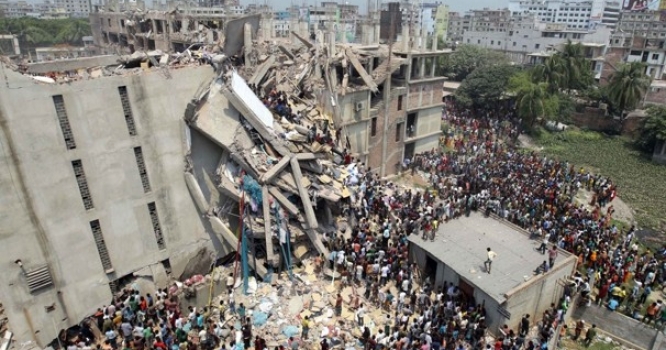Normally we do not include opinion pieces on our blog, but after this week, I felt it was time to speak up a bit. In Bangladesh this week, an 8-story building collapsed, killing over 300 people. This building housed several garment factories in the town of Savar that produced clothing for many familiar companies we see here at home.
Who is responsible?
First off, the reports state that there was knowledge of cracks on the building and the police had ordered an evacuation. However the factory owners claimed everything was ok and made everyone go back to work the next day. I would be curious to know whether this pressure was strictly at the mercy of the factory owners, or if there was pressure from the contracting companies to keep things going. As for the companies involved, AP states:
“Among the businesses in the building were Phantom Apparels Ltd., New Wave Style Ltd., New Wave Bottoms Ltd. and New Wave Brothers Ltd. garment factories, companies that make clothing for brands including Benetton, The Children’s Place and Dress Barn. Workers said they didn’t know what specific clothing brands were being made in the building because labels are attached after the products are finished.”
These big clothing companies did not cause the collapse, but they certainly are not helping. One could say that they are bringing jobs to an area that really needs it, and they are helping the community. However I can just about guarantee that bringing these production jobs had little to do with the desire to stimulate their economy and help with growth. They brought these jobs to Bangladesh because they are currently cheaper than China. These companies are not investing in better factories or helping with repairs, and they are not there to help the community. They go to factories like this one because they can get away with workers only being paid $37 a MONTH, working long days, six days a week. Sure that might be acceptable there, but we know better.
These companies want to keep cutting their costs so the people at the top can make more money. They are never content with being consistently successful—each year they have to make more and more money. At a certain point quality and ethics are sacrificed.
And then there comes us, the consumer. We demand cheap things. We have been trained to buy lots of cheap things often, instead of investing in more expensive pieces that will live much much longer. We have officially grown into this form of disposable fashion, where we buy an item, expecting you will have to rebuy it next season because it will have already fallen apart, but why? We have formed shopping habits, and we have all been there, so there is no need for finger pointing in this situation. Price used to reflect quality, and now it unfortunately usually reflects how good the marketing is of the big retailers.
What can you do now?
- Every time you buy something, you are actually voting. When you support a certain company, you are also supporting their whole chain, ending at the garment in the store, but not forgetting the farmer who grew the cotton, the factory that made the textile, the person who designed the pattern and sizing, the people that actually sewed the garments, and all the little people in between that maintained the machinery, the transportation from place to place to place, and so forth.
- Also, if you find a company that you love, because of the quality or good business practices, tell others! Word of mouth is such a great force!
- Go to your local markets and buy fun jewelry and clothing from local artists. There is no need to feel guilty after shopping, but it is totally possible to feel good about your purchases. That money is going directly back into your community, and you can actually meet the people who made it.
Nothing will ever get done until we start the conversation. If you disagree with what I am saying, please leave a comment, and if you agree with what I am saying, please leave a comment as well. I feel like we have all gotten so used to just reading, and I genuinely want to start the conversation, so please, start somewhere and just share your thoughts.
You can learn more about the collapse of the factory here. Image courtesy of the Washington Post.

Nicely worded, buddy! Its a tragic story, compounded by the fact that it happens again, and again, just in different countries.